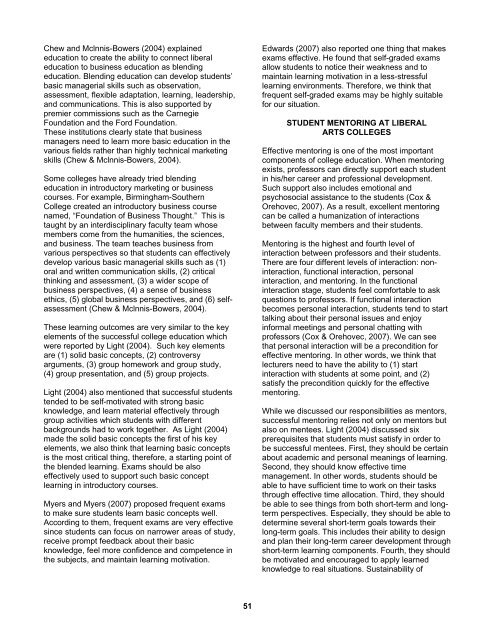2008 - Marketing Educators' Association
2008 - Marketing Educators' Association
2008 - Marketing Educators' Association
Create successful ePaper yourself
Turn your PDF publications into a flip-book with our unique Google optimized e-Paper software.
Chew and Mclnnis-Bowers (2004) explained<br />
education to create the ability to connect liberal<br />
education to business education as blending<br />
education. Blending education can develop students’<br />
basic managerial skills such as observation,<br />
assessment, flexible adaptation, learning, leadership,<br />
and communications. This is also supported by<br />
premier commissions such as the Carnegie<br />
Foundation and the Ford Foundation.<br />
These institutions clearly state that business<br />
managers need to learn more basic education in the<br />
various fields rather than highly technical marketing<br />
skills (Chew & Mclnnis-Bowers, 2004).<br />
Some colleges have already tried blending<br />
education in introductory marketing or business<br />
courses. For example, Birmingham-Southern<br />
College created an introductory business course<br />
named, “Foundation of Business Thought.” This is<br />
taught by an interdisciplinary faculty team whose<br />
members come from the humanities, the sciences,<br />
and business. The team teaches business from<br />
various perspectives so that students can effectively<br />
develop various basic managerial skills such as (1)<br />
oral and written communication skills, (2) critical<br />
thinking and assessment, (3) a wider scope of<br />
business perspectives, (4) a sense of business<br />
ethics, (5) global business perspectives, and (6) selfassessment<br />
(Chew & Mclnnis-Bowers, 2004).<br />
These learning outcomes are very similar to the key<br />
elements of the successful college education which<br />
were reported by Light (2004). Such key elements<br />
are (1) solid basic concepts, (2) controversy<br />
arguments, (3) group homework and group study,<br />
(4) group presentation, and (5) group projects.<br />
Light (2004) also mentioned that successful students<br />
tended to be self-motivated with strong basic<br />
knowledge, and learn material effectively through<br />
group activities which students with different<br />
backgrounds had to work together. As Light (2004)<br />
made the solid basic concepts the first of his key<br />
elements, we also think that learning basic concepts<br />
is the most critical thing, therefore, a starting point of<br />
the blended learning. Exams should be also<br />
effectively used to support such basic concept<br />
learning in introductory courses.<br />
Myers and Myers (2007) proposed frequent exams<br />
to make sure students learn basic concepts well.<br />
According to them, frequent exams are very effective<br />
since students can focus on narrower areas of study,<br />
receive prompt feedback about their basic<br />
knowledge, feel more confidence and competence in<br />
the subjects, and maintain learning motivation.<br />
51<br />
Edwards (2007) also reported one thing that makes<br />
exams effective. He found that self-graded exams<br />
allow students to notice their weakness and to<br />
maintain learning motivation in a less-stressful<br />
learning environments. Therefore, we think that<br />
frequent self-graded exams may be highly suitable<br />
for our situation.<br />
STUDENT MENTORING AT LIBERAL<br />
ARTS COLLEGES<br />
Effective mentoring is one of the most important<br />
components of college education. When mentoring<br />
exists, professors can directly support each student<br />
in his/her career and professional development.<br />
Such support also includes emotional and<br />
psychosocial assistance to the students (Cox &<br />
Orehovec, 2007). As a result, excellent mentoring<br />
can be called a humanization of interactions<br />
between faculty members and their students.<br />
Mentoring is the highest and fourth level of<br />
interaction between professors and their students.<br />
There are four different levels of interaction: noninteraction,<br />
functional interaction, personal<br />
interaction, and mentoring. In the functional<br />
interaction stage, students feel comfortable to ask<br />
questions to professors. If functional interaction<br />
becomes personal interaction, students tend to start<br />
talking about their personal issues and enjoy<br />
informal meetings and personal chatting with<br />
professors (Cox & Orehovec, 2007). We can see<br />
that personal interaction will be a precondition for<br />
effective mentoring. In other words, we think that<br />
lecturers need to have the ability to (1) start<br />
interaction with students at some point, and (2)<br />
satisfy the precondition quickly for the effective<br />
mentoring.<br />
While we discussed our responsibilities as mentors,<br />
successful mentoring relies not only on mentors but<br />
also on mentees. Light (2004) discussed six<br />
prerequisites that students must satisfy in order to<br />
be successful mentees. First, they should be certain<br />
about academic and personal meanings of learning.<br />
Second, they should know effective time<br />
management. In other words, students should be<br />
able to have sufficient time to work on their tasks<br />
through effective time allocation. Third, they should<br />
be able to see things from both short-term and longterm<br />
perspectives. Especially, they should be able to<br />
determine several short-term goals towards their<br />
long-term goals. This includes their ability to design<br />
and plan their long-term career development through<br />
short-term learning components. Fourth, they should<br />
be motivated and encouraged to apply learned<br />
knowledge to real situations. Sustainability of


